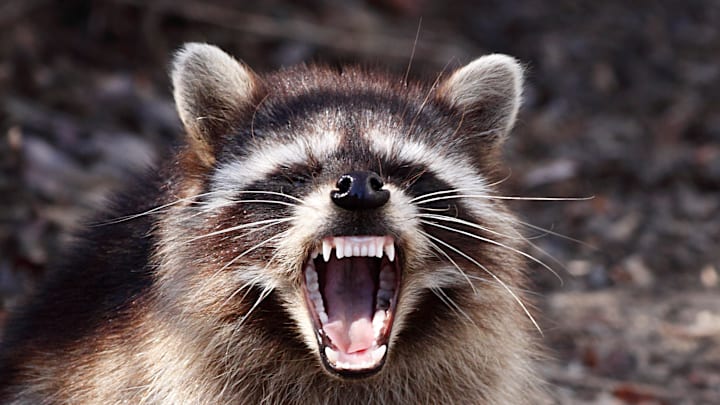It's the stuff of nightmares—or at least a made-for-Hulu horror movie. Every night, dozens of raccoons would descend upon a residential home near Poulsbo, Washington, scraping their tiny claws on the siding and demanding to be fed. Moody and impatient, they encircled the homeowner, whose only recourse was to throw her aggressors food. When they reached roughly 100 assailants, she called 911 for help; when deputies arrived, she made a dash for her car.
The tale is true, chronicled by NBC 9 News in Washington and picked up by The New York Times. And while the unnamed woman is presumably safe from the raccoons, hers is a cautionary tale about why it’s unwise to feed wild animals.
Per NBC 9, the woman had been generously leaving out food to a handful of raccoons that had been idling near her house for years. But things took an abrupt turn when a growing number of raccoons discovered this new source of sustenance. While her familiar guests were docile, the others were reportedly larger and meaner.
One might think being friendly toward animals might result in a pleasant exchange. But that’s not always the case. “We discourage people from feeding wildlife, as this causes them to lose their natural fear of people, which can lead to aggression,” Bridget Mire of the Washington Department of Fish and Wildlife told The Times.
Being targeted by raccoons is just one consequence. When several wild animals congregate in a place, it’s possible for diseases to spread more easily among them or among neighborhood pets. Some, like distemper and rabies, can be fatal.
Wildlife also has a knack for failing to keep a secret. If a home becomes known as a food resource, it might prompt visits by significantly less cute predators like coyotes. Again, this problem can also spread to nearby homes.
So why does feeding birds seem to get a pass? Many wildlife experts actually caution against setting up bird feeders for many of the same reasons: overcrowding that can lead to disease spread. Others, however, believe feeders can assist bird survival in harsh weather, and disease transmission can be mitigated by regular cleaning of food surfaces.
As for the Poulsbo invasion: After trapping proved prohibitively expensive, the woman was advised by local wildlife officials to simply stop feeding the raccoons. Absent any food, they’ve found other places to loiter. Perhaps the nearest fast food dumpster.
